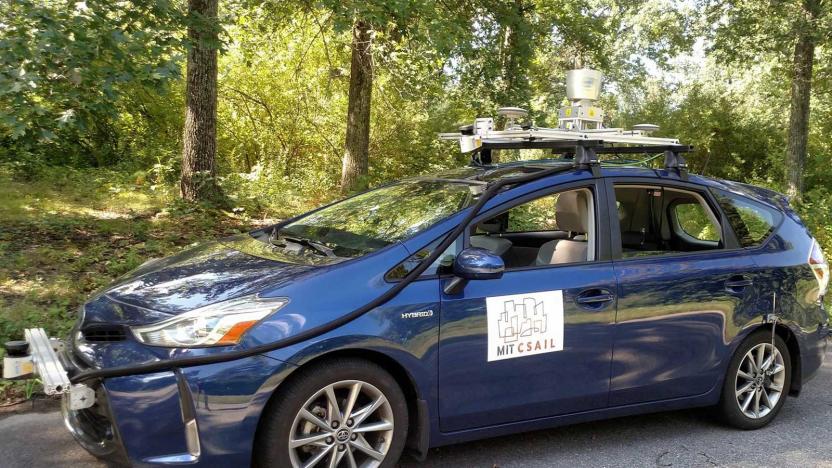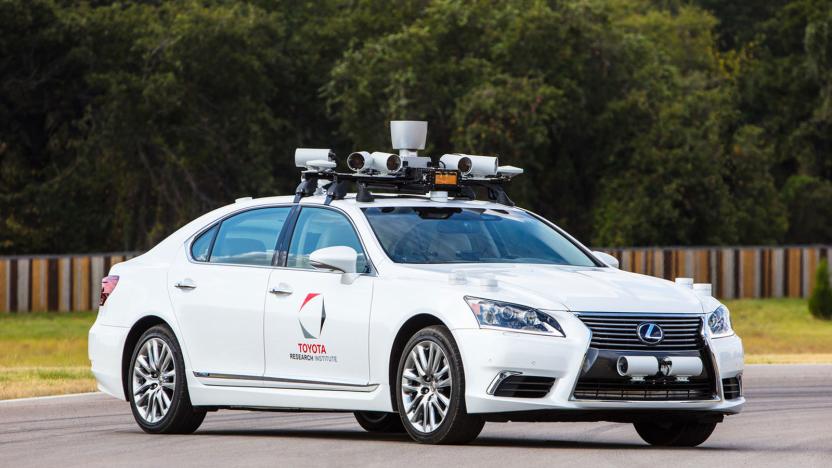tri
Latest

Toyota is using VR to train robots as in-home helpers
Home robots could make all of our lives easier, and perhaps most importantly, they could allow seniors to live more independently. But training robots to operate in homes is difficult because each home is unique and filled with so many objects in different combinations and layouts. Toyota Research Institute (TRI) may have a solution: using virtual reality to change the way we train robots.

MIT's self-driving car can navigate unmapped country roads
There's a good reason why companies often test self-driving cars in big cities: they'd be lost most anywhere else. They typically need well-labeled 3D maps to identify curbs, lanes and signs, which isn't much use on a backwoods road where those features might not even exist. MIT CSAIL may have a solution, though. Its researchers (with some help from Toyota) have developed a new framework, MapLite, that can find its way without any 3D maps.

Toyota will test risky self-driving scenarios at a Michigan track
It's not enough to test self-driving cars in realistic conditions -- if they're going to avoid crashes, they need to handle nightmare scenarios. Toyota is about to address that. It's building a closed test facility at Michigan Technical Resource Park (below) that will pit autonomous cars against "edge case" scenarios that will challenge the technology's limits. It's planning to subject vehicles to clogged urban landscapes, slick roads and even a four-lane highway with fast entrance and exit ramps.

Toyota will test self-driving cars at tough California proving ground
Now that Toyota has unveiled its latest self-driving car prototype, it needs a good test course to put the vehicle through its paces... and thankfully, there's already one lined up. Toyota has struck a deal to test its autonomous vehicle tech at GoMentum Station, the California test course known for its tough, realistic conditions. The automaker's cars will be subjected to "extreme driving events" that wouldn't be safe to test on public roads, and will experience a wide variety of conditions that include bridges and tunnels.

Toyota put on a race to find the most-efficient drivers
There's an air of excitement in the car as we whip around a corner at Sonoma Raceway, 45 minutes north of San Francisco. The passenger up front is barking stats at the driver while staring at an iPad: "We're at 24 percent, 27 percent, 32 percent, 37 percent! OK, we're at 40 percent. Hold it there." The driver responds in the affirmative and the car continues down the track at a blistering 25 miles per hour. The Prius we're sitting in isn't going to break any speed records. Instead, it's being pushed to the limits of its efficiency.

Puzzling first-person platformer Tri-ing to gather Greenlight votes
Rat King Entertainment recently launched its Steam Greenlight page for 3D puzzle-platformer Tri. The game, a first-person platformer in the same vein as Antichamber, has players exploring towers and dungeons, building platforms and solving puzzles along the way. Tri's alpha version, composed of 12 levels, is available now through the Humble Store, Desura and Indie Game Stand for $10. Buying the PC, Mac and Linux game now amounts to a pre-order, as players will receive an upgrade to the full version of Tri when it launches somewhere between Q4 2013 and Q1 2014.

Terminal Reality seeking programmers for 'seriously high-quality' Natal project
Wait a minute. Now we're confused. We thought one of the major development incentives for joining the motion revolution was to conserve resources in the production department. When your players are busy flailing and flapping -- surging with euphoric endorphins -- they don't exactly notice that you've scaled back on the fancy schmancy rendering and physics; all that excessive cutting edge tech. Heck, they'd barely notice if you repurposed and resold them a game you'd made 5 years ago. Motion control, man, it's about getting back to our roots -- a simpler time -- when games were, like, about connecting with our bodies, you know? So when we caught wind of a job opportunity posted by Ghostbusters developer Terminal Reality and calling for experienced Xbox Live programmers to create "an exciting AAA Natal title," we were sorta like, whoa, guys, you're kinda missing the point. Check this: "If you have a passion to create seriously high-quality action/adventure titles, we're interested in hearing from you!" Really ... passion? That makes it sound like there will be sweat involved -- that's the players' job now. You guys gotta dial it down, maybe dig up some of that old BloodRayne code, put a little "kick-punch-slap" control in there ... Save. Press. Box. Ship. Done. [Via Shogun Gamer; thanks, Ian]



